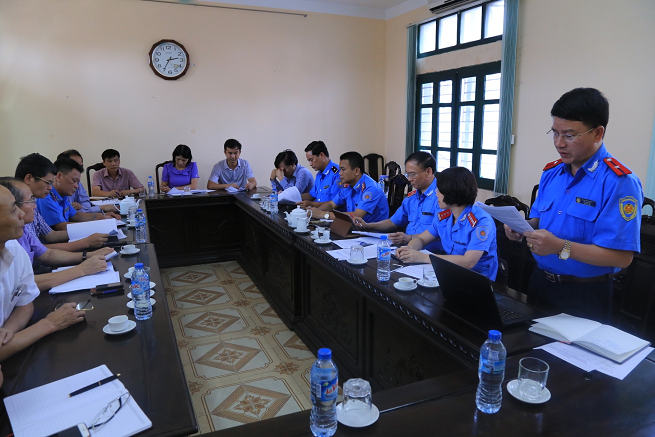After a period of implementation, several provisions of the Law on Public Employees have revealed limitations and inadequacies, failing to promptly meet the practical requirements. Therefore, the Ministry of Home Affairs has conducted a review, evaluation, and proposed amendments and supplements to the Law on Public Employees to ensure consistency and synchronization between the regulations of the Communist Party and the laws related to personnel work.
Law on Public Employees 2010, passed by the XIIth National Assembly on November 15, 2010, took effect on January 1, 2012. The Law on Cadres, Civil Servants, and the Law on Public Employees was promulgated to remedy the shortcomings of the 1998 Ordinance on Cadres and Civil Servants to meet the demands of building a socialist rule-of-law state of the people, by the people, and for the people. It aims to construct a clean, efficient, and effective administration aligned with the transition towards a service-oriented administration and the policy of improving the quality of the cadre corps of the Communist Party. After a period of implementation, certain provisions of the Law on Public Employees have shown limitations and inadequacies, unable to promptly meet practical requirements. Therefore, the Ministry of Home Affairs has proceeded to summarize, evaluate, and propose amendments and supplements to the Law on Public Employees to ensure consistency and synchronization between the regulations of the Communist Party and the law in personnel work.
1. On renewing the operational mechanism of public service providers
Resolution No. 19-NQ/TW dated October 25, 2017, of the 6th Central Conference of the XIIth Central Committee on continuing to renew the organizational and management system, improving the quality and efficiency of public service providers, set forth comprehensive tasks and solutions on restructuring and reorganizing public service providers, managing staffing, enhancing human resource quality, improving the management capacity of public service providers, and enhancing the effectiveness and efficiency of state management of public service providers.
Therefore, it is necessary to study, amend, and supplement the regulations on the organizational structure managing the operations of public service providers, the policy framework for the development and support of public service providers, to improve human resource quality, management capacity, and state management effectiveness and efficiency concerning public service providers in Articles 9 and 10 of the Law on Public Employees.
2. On contracts for public employees
Clause 2, Article 24 of Law on Public Employees 2010 stipulates: Based on the recruitment results, the head of the public service provider signs a working contract with the recruited person for a public employee. Currently, the content regarding working contracts for public employees is regulated in Section 2, Chapter III of the Law on Public Employees, under which newly recruited public employees will sign a fixed-term contract (from 12 to 36 months); after the expiration of the fixed-term contract, the public employee will sign an unspecified term contract. This method of regulation is similar to the provisions on labor contracts in the Labor Code.
However, Resolution No. 19-NQ/TW dated October 25, 2017, of the 6th Central Conference of the XIIth Central Committee on continuing to renew the organizational and management system, improving the quality and efficiency of public service providers has determined: Implementing the policy of fixed-term contracts for newly recruited public employees (except for public service providers in remote, isolated, and socio-economically particularly difficult areas). This is also a content that needs to be studied and amended in the Law to institutionalize the Party's policies and orientations, avoiding the mentality of “lifetime tenure” among the public employee workforce.
Furthermore, it is necessary to amend and supplement to perform the policy of fixed-term contracts for newly recruited public employees (except for public service providers in remote, isolated, and socio-economically particularly difficult areas - Clause 2, Article 24).
Amendment and supplementation are also needed to address the situation of public employees transferring from one public service provider to another according to decisions from competent authorities or unilaterally terminating working contracts but still being paid allowances (Article 45).
3. Management of public employees
3.1. On severance policy for public employees
According to the provisions of Article 45 of the Law on Public Employees, when terminating a working contract, public employees are entitled to severance allowances, job loss allowances, or unemployment insurance benefits in accordance with labor law and social insurance law (except for cases of forced resignation or unilateral contract termination). Simultaneously, according to Clause 4, Article 28 of the Law on Public Employees, when a public employee transfers to work at another agency, organization, or unit, the working contract will be terminated, and policies and regimes according to the law will be resolved. However, unreasonable issues have arisen in practice regarding the settlement of severance policies for public employees transferring from one public service provider to another according to plans from competent authorities (e.g., the transfer of teachers and doctors within local areas) or unilateral termination of working contracts (not due to job loss). Paying severance allowances and job loss allowances in these cases is unreasonable and unfair compared to public employees retiring according to regulations (as retirees do not receive severance or job loss allowances). Moreover, this regulation leads to policy evasion when public employees nearing retirement age apply for severance to benefit from severance policies. Therefore, studying amendments and supplements to the Law on Public Employees related to severance policies is necessary.
3.2. On decentralizing some public employee management contents
Implementing the tasks and solutions proposed in Resolution No. 19-NQ/TW on promoting decentralization, granting autonomy to public service providers by clearly distinguishing state management from public service provider management and service provision, and implementing Resolution No. 21/NQ-CP dated March 21, 2016, of the Government on decentralizing state management between the Government and the People's Committees of provinces and centrally-run cities, reviewing, researching, amending, and supplementing regulations of the Law on Public Employees regarding “state management of public employees” and “public employee management” is necessary.
Therefore, regulations on state management of public employees and public employee management need to be amended and supplemented, emphasizing clear decentralization to ministries, central authorities, and local authorities, enhancing inspection and supervision, and focusing on post-inspection work of state management agencies concerning officials and public employees (Articles 31, 33, 47, 48, 49, 50).
3.3. On transitioning between public employees and officials
According to current regulations of the Law on Cadres and Civil Servants, public employees holding leadership and management positions in public service providers are recognized as officials. However, Resolution No. 19-NQ/TW has determined not to implement the policy of officials in public service providers (except for units serving political tasks and state management). Therefore, studying amendments to Article 58 of the Law on Public Employees to align with this determination while ensuring connectivity between the public employee workforce and the officials' workforce in the political system is necessary.
4. On disciplinary actions towards public employees
Similar to the content on disciplinary actions against officials, the provisions relating to disciplinary actions against retired public employees or those transferred out of the public service provider sector, disciplinary forms, and the statute of limitations for disciplinary actions against public employees should also be amended to ensure consistency between the Party's discipline and the State's discipline.
Therefore, amendments and supplements are needed for the disciplinary regulations for public employees according to the Central Committee's conclusions (Articles 53 and 56).
Judicial Journal
 Article table of contents
Article table of contents
![[InfoGraphic] 6 forms of discipline for officials and public employees under Decree 71/2016/ND-CP](https://cdn.lawnet.vn//uploads/NewsThumbnail/2016/07/12/1319291-01.png)




.Medium.png)
.Medium.png)
.Medium.png)
.Medium.png)
